- New Products
- Exclusive Gear
- Bushcraft Gear
- Containers
- Cooking
- Fire
- First Aid
- Food Gathering
- Knives & Tools
- Knife Collectors Corner
- Light
- Logo Gear
- Misc. Items
- Navigation
- Packs, Pouches & Bags
- Personal Care
- Repair Gear
- Shelter & Protection
- Signaling
- Urban Survival
- Water
- Writing Gear
- John's Books
- Bargain Bin
Don't Bank On Banks
This may sound like a contradiction of terms, but let me explain. As we have discussed earlier, in order to be self-reliant you can't rely on others for everything. However, most people rely on banks for the holding, safekeeping and the dispersing of their money. Many people today don't even see their money on payday, but instead, have it deposited directly into their bank account. This is with the blind faith, that when they want it, it will be available.
In most cases the system works. But what if it didn't? What if the bank's closed and didn't open back up. I'm sure you are thinking that this is very unlikely to happen, but it could.
On March 6, 1933 President Franklin D. Roosevelt declared a "Bank Holiday" for four days in an attempt to prevent a run on banks. Of course that was a long time ago but on March 16, 2013, all banks in Cyprus closed for two weeks, in order to avert a run on deposits. When they reopened, they did so with strict restrictions on transactions, such as a limit on cash withdrawals, and no checks being cashed. The banks had planned on seizing ten percent of all bank accounts to help keep the government afloat, but that did not occur.
There are already limits in the U.S. on the amount of money you may withdraw from your own account without a report being filled out and sent to the government. On large withdrawals, some banks have actually asked people why they want the money, almost as if it was the banks money, and not yours.
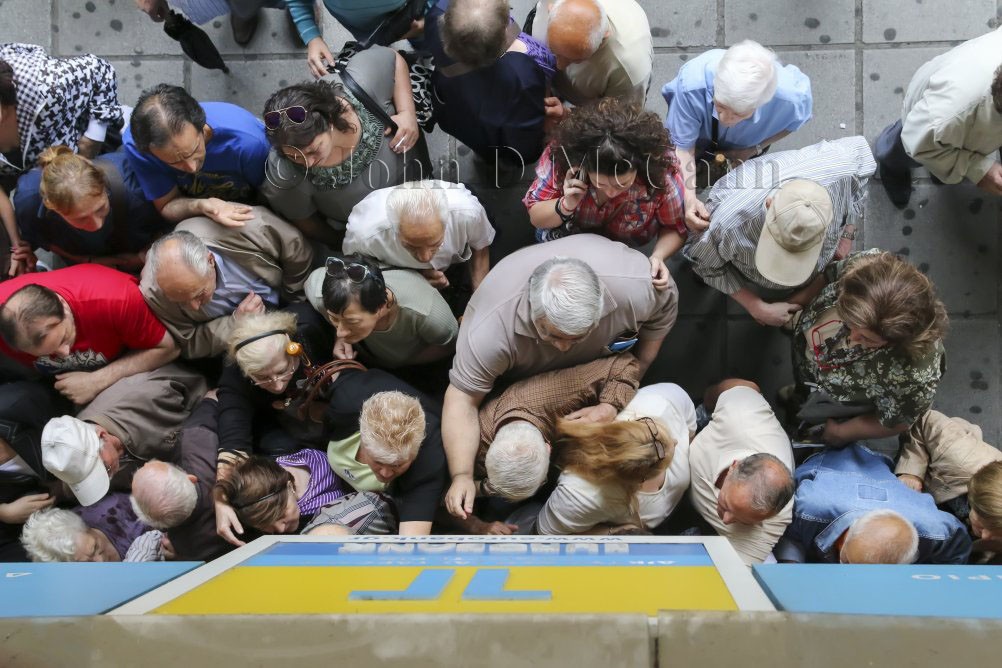 What would do if you went to your bank and it was closed until further notice?
What would do if you went to your bank and it was closed until further notice?
Many people rely on their bills being paid through the bank. They trust that when they need their money, it will be available. After all, their money is insured by the government. But that insurance, the FDIC (Federal Deposit Insurance Corporation) guarantees that every depositor will receive up to $250,000.00 of their deposits. Anything over this amount is not insured, and if our financial system collapsed, where would they get the money to pay everybody? They wouldn't, and you would be out the money.
Also keep in mind that we are not talking strictly banks here. We are talking ATM's and charge cards. They are all tied to the banking system. If banks fail, ATM's will fail, and your charge cards will fail. If charge cards fail, when you go into the grocery store to buy food, you will need cash. Have you ever played dominoes? Well then you get the idea.
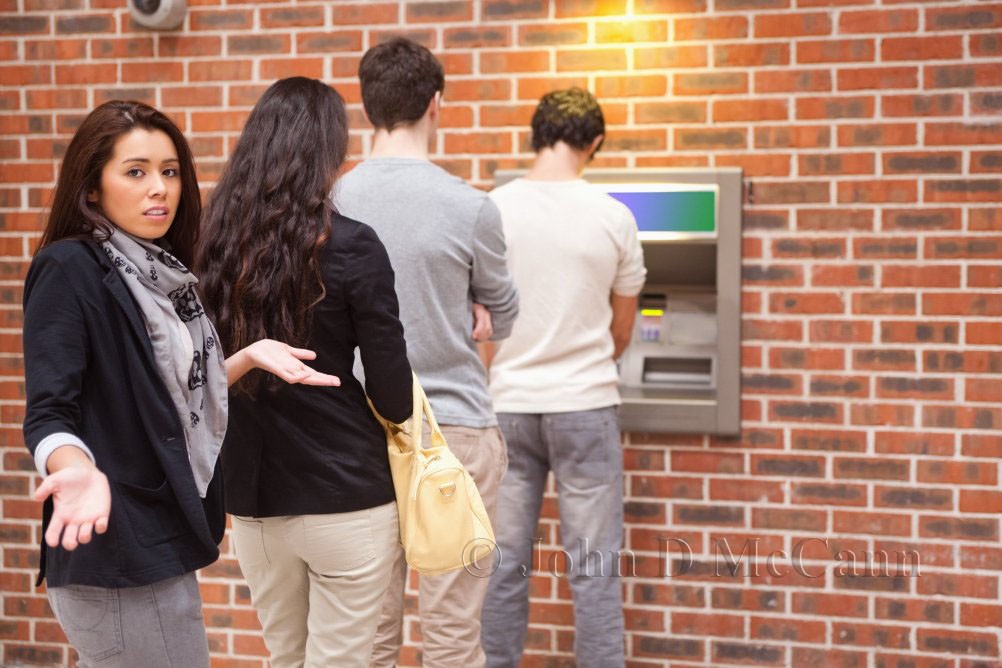 If banks closed and ATM's and charge cards failed to work, how much cash do you have on hand to buy things?
If banks closed and ATM's and charge cards failed to work, how much cash do you have on hand to buy things?
Keep in mind that an occurrence like this does not require our monetary system to crash. This could also be a result of a crash of the power grid. It doesn't even have to be a major incident like an EMP (Electromagnetic Pulse). It could simply be a local power failure. I have gone ten days without power in our area and most of the grocery, and other stores, closed their doors.
The big question is how long could you go if something like this did happen? Days, weeks, months. I see people everyday buying coffee in the morning using charge cards. Do they have any cash on hand, or do they literally rely on the banking system for their very existence? If you want to be self-reliant, don't rely completely on banks.
Cash Is King
Everybody should have some cash on hand. When I was young, everybody had a least a few dollars in a coffee can. As we saw above, you can't rely on an ATM for any cash you need. I always recommend having at least a couple of hundred dollars secured at your home, if not more. It should not be kept in a coffee can, but in an area that is safe from theft and fire.
Everybody should be able to afford a small "Sentry" type safe that can hold your cash and other small valuables. These types of fireproof safes are easily concealed in the home.
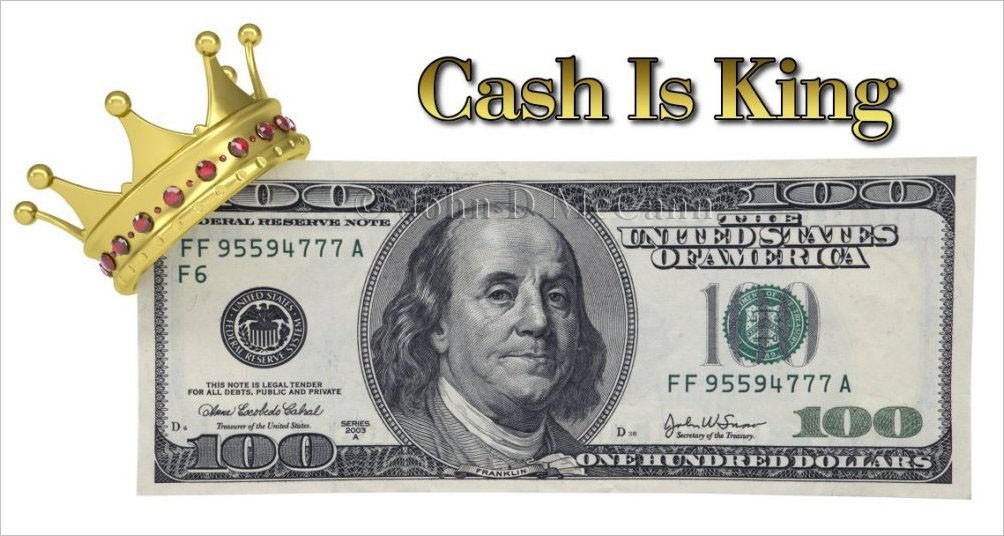 Everybody should keep some cash on hand in case of an emergency.
Everybody should keep some cash on hand in case of an emergency.
Keep in mind, that cash can also fail. It would take a complete collapse of our monetary system, but it could happen. Our money used to be backed by gold. However, in 1971 President Richard Nixon announced to the world that the U.S. dollar was no longer backed by gold, even though he still wanted the world to use the dollar as the "reserve currency."
The problem with the dollar today is inflation. And with the government pumping out new bills like Pez from a Pez dispenser, and a deficit growing every day, I don't see an end to inflation. I told my wife, who you now know is from Switzerland, that when I was young I used to pay twenty-five cents for a gallon of gas, and now I pay almost $4.00. I asked how the price of gas could increase 1,550 percent over forty-five years. She quickly said, "It didn't, inflation has reduced the worth of the dollar by that much." Think about it; of course the price of things has increased in forty-five years, but the majority of the increase in price is a decrease in the worth of our dollar.
Until we can come up with something better, cash will still be king, at least as long as we are allowed to use it. There are rumors, but for now, if you want to be able to take care of your needs, keep some cash on hand.
Eliminating Debt
Freedom comes at a price, and a priority for anyone who wants to be self-reliant is eliminating debt. Nothing makes you more dependent on others than debt. When you owe other people you are indebted to them, and have an obligation to pay them back.
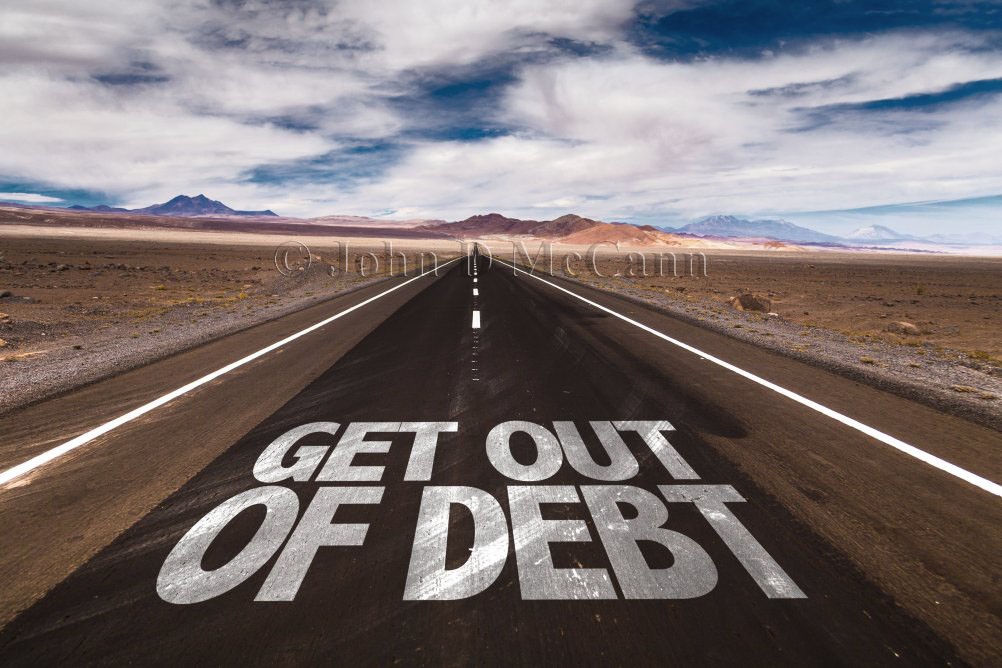 Eliminating debt is one of the most important things you can do!
Eliminating debt is one of the most important things you can do!
Reducing debt is not always easy, but it can be done. First you must return to the "Needs vs. Wants" axiom. This starts with having a budget. Unfortunately, you cannot function like our government does and spend more than you have coming in, because you don't have the luxury of being able to just print more money, or tax other people to make up for your overspending. Our government has a Twenty Trillion dollar deficit because they have never learned this basic principal. You cannot spend more than you make, at least not for long.
Determine what your income is per month, and then determine what your actual expenses are per month. You must be honest here and include ALL expenses. If you have expenses that only occur every six months, or annually (like land tax, etc.) then those expenses must be amortized so that each month a portion of that expense is saved, or put away, for when the debt is due.
If your expenses per month are more than your income then you have some serious decisions to make. You will either need to reduce some of your expenses, or increase your income. You need to set up a budget that will allow you to pay your bills and have something left over for savings. This is a simplification, but the only real way to reduce debt. The more you make, and the less you spend on expenses, the more you will have for savings, and to pay down the debt you already have. There is no magic involved here. It is as simple as that.
Once you have determined a budget, you need to get your charge cards under control. I would say eliminate them, but they can come in handy at times. However, if you use them, then use them like cash. If you can't afford cash for your purchase, then you probably can't afford the charge. If you are buying a larger "Need" item like a new furnace or stove, and you can't wait, then you should have the extra money in your budget for that additional monthly payment. Keep in mind that if you do not pay off the purchase the first month, you will be paying interest which adds to the cost of each item.
I have found over the years that if you get your charge cards under control, and save money, you are less likely to need them. If I use a charge card now, the balance is always paid when the bill arrives.
The hardest debt to eliminate is a mortgage, but that too can be done. I know many people who have a huge mortgage because they have a place that is far too large for their needs. If they would reduce the size of their home and increase their land size, they would be better off for the purposes of self-reliance. Often it is a "Keep Up With The Jones's" syndrome and it is a shame. A big house, fancy cars, and a need to impress others is not a formula for success, especially if you are trying to become less dependent on others.
It gives you a good feeling to have zero debt. It is not easy, but I proved it can be done. It takes time, effort, and many trade-offs. Only you can make it happen.
Investments
When most people think of investments, they think of stocks and bonds, IRAs, 401Ks, etc. I personally have a different view of investments. First, let me say right up front, I AM NOT an investment consultant, nor have I played one on television. I am not providing any recommendations in regard to the personal investment of your money, only presenting my perspective on the subject.
My father always told me to beware of the middleman. He who gets his share, no matter how you are affected, can't be good for you. As an example, a stockbroker gets a commission when you buy a stock, and gets another commission when you sell the stock. This commission has no relationship to how the stock does while you own it. Whether the stock goes up, or goes down, the stockbroker makes money, which comes out of your profits, or losses.
Our government works the same way with taxes. You do the work, then you pay a portion of what you earn, to them. If you invest it, and are lucky enough to make a profit, you then get to give more to the government in taxes. If you buy something, you get to pay additional sales tax to a government agency. At the same time, because of irresponsible spending of tax dollars, and the lack of a budget to control that spending, our money is being devalued more each day. Never forget Germany after WWI when they needed a wheelbarrow full of paper money to buy a loaf of bread.
Unfortunately, it is difficult to invest as a means to grow assets which in the end are worth less because of inflation. My idea of investing is to preserve what I already have, and avoid having that eroded by inflation.
One of those areas is precious metals. Gold and silver will always be worth something, and have never been worth nothing. But if you invest in precious metals, do so with the idea that it may have to be used as a means of trade or barter. I know people who buy one ounce gold pieces, but in reality, it will be difficult to trade or barter with a coin that is worth over twelve hundred dollars, unless there is something big you need. I have always found that one-tenth ounce gold pieces are more practical for that type of a situation. Silver can be considered in the same realm as gold. Many smaller denomination coins might be easier to use for buying goods if paper money doesn't work or exist. I especially like pre-1964 silver as a dime or quarter is still a dime or a quarter.
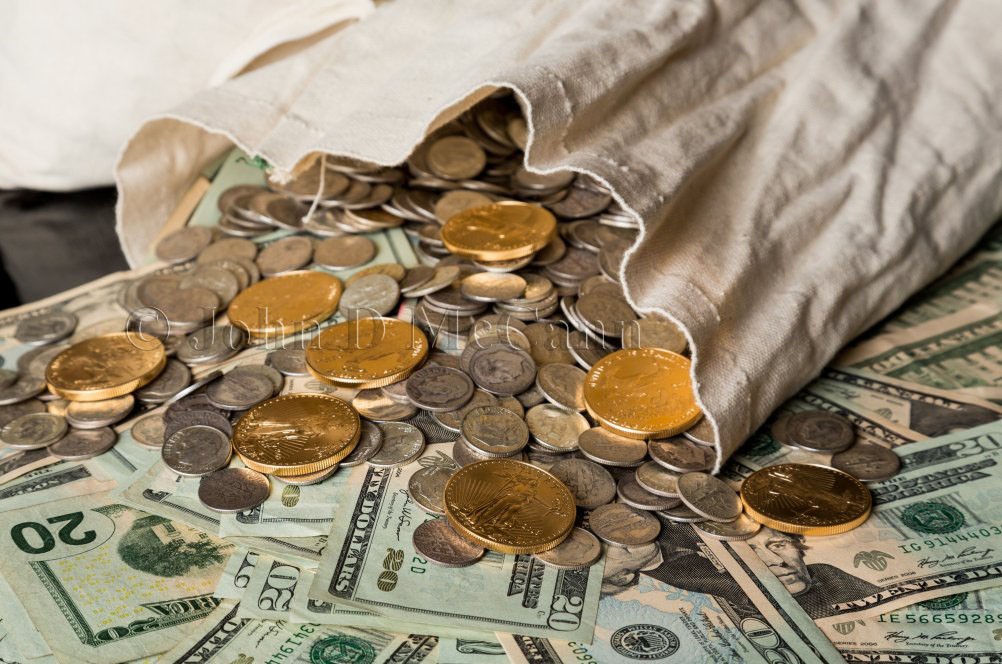 If you invest in precious metals, make sure the denominations are small enough that you will be
If you invest in precious metals, make sure the denominations are small enough that you will be
able to barter with them.
Keep in mind that a time could come when the owning of gold or silver is regulated, or even prohibited by the government. I have had some younger people indicate that such a prohibition is very unlikely. Yet in 1933 the Emergency Banking Act made it illegal for American citizens to physically own gold (the exclusion was you could own up to 100 dollars face value in gold, and some rare coins with collector value). All gold had to be sold to the government for $20.67. The Government then raised the price of gold to $35.00 an ounce making a hardy profit on gold that had been yours! It was not until 1974 that the act was repealed, again allowing American citizens to own gold. Keep in mind that the reason for the act was a great depression, and I keep hearing that our current depression is the worst since the Great Depression. This has to make you think, and act with caution.
I have always found that certain investments never depreciate or go down in price. One of these is quality tools. I have tools that were owned by my grandfather and father and it is difficult to find tools to equal them today. My grandfather always told me as a child, buy the best tools you can afford, get the best quality, and buy them once. If you buy cheap junk, you will be buying those tools the rest of your life. I have never forgotten those words and even though the price of tools keeps going up, it seems the quality keeps going down.
Now, I certainly am NOT suggesting or recommending that you run out and take all your money out of the bank or cash in your IRA. But, as with all self-reliant strategies, be prudent and don't put all your eggs in one basket.
If you invest, do so wisely, with a thought to the future. If everything goes well, all investments will do fine. But, if the bottom falls out and our money is worthless, have some alternatives to help get you through.
Bartering
Bartering has been a means of exchange long before we had currency. Basically, bartering is a system of exchange whereby goods or services are exchanged for other goods or services without using a currency, e.g., money. Having a currency has made it easier for people to trade goods, but if that means of exchange disappeared, bartering would again be the way for people to obtain what they need. However, keep in mind that bartering can be a medium of exchange even if currency does exist.
 You can barter without money if two people have things that the other wants. Even skills can be
You can barter without money if two people have things that the other wants. Even skills can be
bartered for goods.
Skills will go a long way. If someone needs something your skills can provide, then you have something to barter with. If somebody needs a sheath for a knife or a holster for a gun, I know I can provide that. If they need a porch fixed or something built, I know I can provide that as well. Now what does the other person have that I need and is willing to trade for my skills. This is why skills are so important, because many people don't have them.
On the other hand, if you have extra supplies, you can barter for other supplies, or for skills that you don't have. There are many lists out there that will tell you what will be the most important items to have for barter if something catastrophic happens, but nobody really knows what will be important to other people if that did indeed happen.
I try to look at it as a "needs" thing and everybody's needs are different. But there are certain things that everybody either needs or wants. Although alcohol and tobacco both have high health risks, they are also comfort items during stressful times. They would both be good barter items.
Food will always be a need and therefore good for bartering. If you have a garden, you have a renewable barter item. Grow more than you need and barter the rest. The same can be said for eggs, if you have chickens.
People always need shelter and warmth. Clothes and blankets will always be on a need list. This is also where the skill of sewing comes in. You can always produce, or repair, items that can be bartered. Firewood is another item that works well for barter.
I could go on listing things, but you get the idea. All the things that we need or have kept extra supplies of, are also needed by other people. Keep bartering in mind when you need something you don't have, and have things that other people don't.
Caching
The caching of valuables has occurred forever. Everybody has heard about buried treasures. This is still an effective means to protect valuables from theft, and fire. It basically entails you placing your valuables in some type of a waterproof container and burying it. It may sound archaic, but I find that it is a good way to hide things.
First of all, it is not fool proof, as someone could always accidentally find your cache. For that reason, again, I never recommend putting all your eggs in one basket. I prefer to place a small amount of valuables in many different caches. If one is found, you don't lose everything.
There are many types of devices you can use for caching, but I find small containers are best, unless you are caching some large items. I use caches mainly for cash, precious metals, and other small valuables, so they do not have to be secured in the home and be accessible to theft or fire.
Two preferred containers for smaller caches are metal ammo cans and PVC pipe. I prefer those made from PVC pipe as I can make them the size I need, which are usually small.
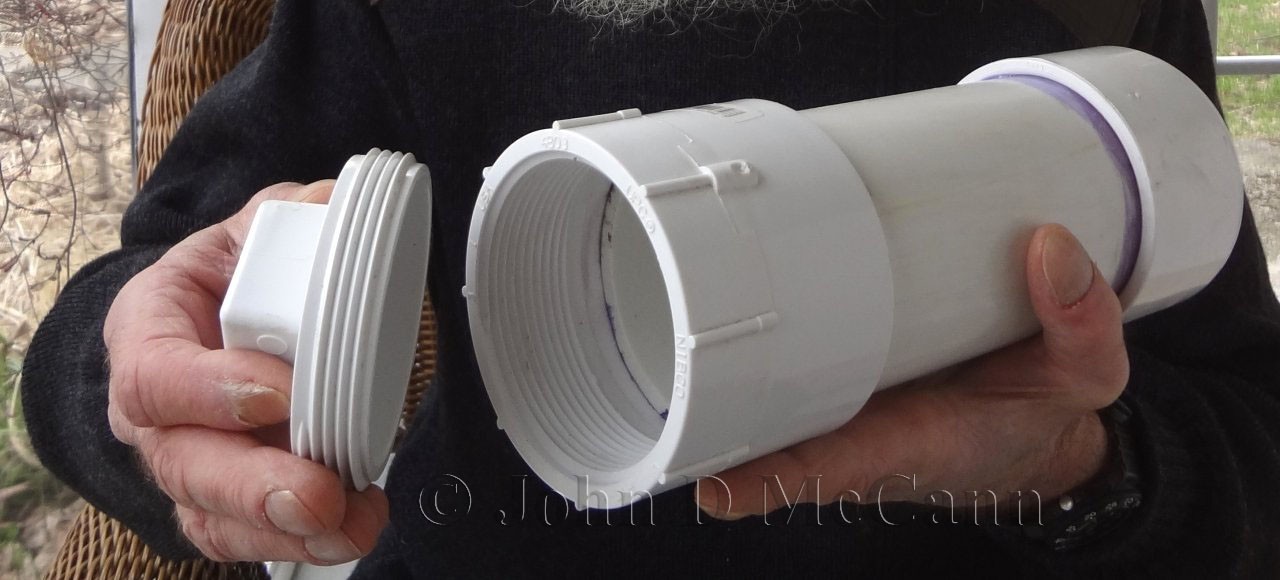 This shows a good size cache tube I made from PVC and ends. It can be used to hold cash, precious metals, or other small valuables.
This shows a good size cache tube I made from PVC and ends. It can be used to hold cash, precious metals, or other small valuables.
Whatever type of waterproof container you decide to use, prepare the contents of the cache container. I like to place my valuables in a heavy vacuum seal bag and vacuum seal it. Include a desiccant in the bag before sealing. After adding the bag to the container, add some more desiccants. Make sure the seal on the container is tight and waterproof.
Keep in mind that I do not cache stuff in hopes of leaving it there for a hundred years. Caching is used as a means to hide and protect the contents. When you need the contents, you need them. Don't bury them far from where you are if you might need the contents in an emergency.
Be careful that you don't place them in an area out of your control as things can change overnight. That new road starts going in through those beautiful woods down the road, and you only notice it as a piece of heavy equipment is observed digging in the area your cache was buried. Another reason to have many small caches, as opposed to one large one, is if you don't have a large piece of land, you might have to use someone else's. However, keep in mind that if you don't have control of the property, your cache is subject to loss.
If you are concerned that you might have to bug-out, or leave the area, in an emergency situation, you might want to have a cache or two buried in the area you intend going to, or one on the route taking you there. Again, all caches are subject to being found by those who do not own them. Cache with caution and be willing to lose what has been cached.
In Closing
Hopefully this article has provided you with some food for thought. You can't and shouldn't always rely on banks or electronic banking to be available. Even if banks are only closed for a few days, if you haven't taken steps to be prepared for that event, you may be in trouble. If they close and don't open, you may have to depend totally on the preventive steps you have taken.
It should be noted that portions of this article appeared originally in my book "Practical Self-Reliance - Reducing Your Dependency On Others."
We hope you enjoyed this article and will help support our efforts by checking out our products. As always, Be Prepared To Survive!
© 2015 by John D. McCann


